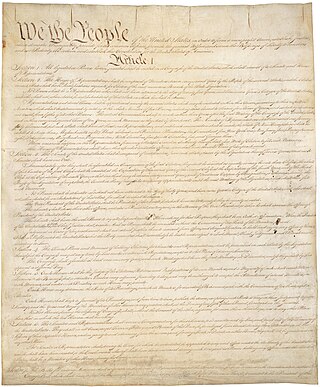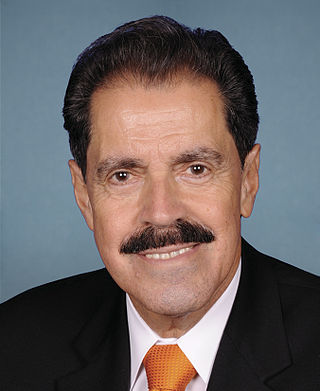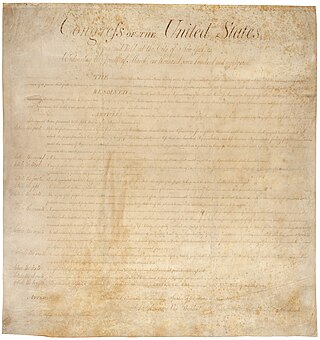
The Constitution of the United States is the supreme law of the United States of America. It superseded the Articles of Confederation, the nation's first constitution, in 1789. Originally comprising seven articles, it delineates the national frame and constraints of government. The Constitution's first three articles embody the doctrine of the separation of powers, whereby the federal government is divided into three branches: the legislative, consisting of the bicameral Congress ; the executive, consisting of the president and subordinate officers ; and the judicial, consisting of the Supreme Court and other federal courts. Article IV, Article V, and Article VI embody concepts of federalism, describing the rights and responsibilities of state governments, the states in relationship to the federal government, and the shared process of constitutional amendment. Article VII establishes the procedure subsequently used by the 13 states to ratify it. The Constitution of the United States is the oldest and longest-standing written and codified national constitution in force in the world today.

Article Five of the United States Constitution describes the process for altering the Constitution. Under Article Five, the process to alter the Constitution consists of proposing an amendment or amendments, and subsequent ratification.

The Twenty-second Amendment to the United States Constitution limits the number of times a person is eligible for election to the office of President of the United States to two, and sets additional eligibility conditions for presidents who succeed to the unexpired terms of their predecessors. Congress approved the Twenty-second Amendment on March 21, 1947, and submitted it to the state legislatures for ratification. That process was completed on February 27, 1951, when the requisite 36 of the 48 states had ratified the amendment, and its provisions came into force on that date.

The Twenty-seventh Amendment to the United States Constitution prohibits any law that increases or decreases the salary of members of Congress from taking effect until after the next election of the House of Representatives has occurred. It is the most recently adopted amendment but was one of the first proposed.
Fourth Amendment may refer to the:
The Tenth Amendment of the Constitution Act 1987 is an amendment to the Constitution of Ireland that permitted the state to ratify the Single European Act. It was approved by referendum on 26 May 1987 and signed into law on 22 June of the same year.
The Twenty-third Amendment of the Constitution Act 2001 of the Constitution of Ireland is an amendment that permitted the state to become a party to the International Criminal Court (ICC). It was approved by referendum on 7 June 2001 and signed into law on the 27 March 2002. The referendum was held on the same day as referendums on the prohibition of the death penalty, which was also approved, and on the ratification of the Nice Treaty, which was rejected.
The Twenty-sixth Amendment of the Constitution Act 2002 is an amendment of the Constitution of Ireland which permitted the state to ratify the Treaty of Nice. It was approved by referendum on 19 October 2002 and signed into law on 7 November of the same year. The amendment followed a previous failed attempt to approve the Nice Treaty which was rejected in the first Nice referendum held in 2001.
The Twenty-first Amendment or 21st Amendment may refer to the:
The Twenty-sixth Amendment may refer to the:
The Twenty-seventh Amendment may refer to:

José Enrique Serrano is an American politician who was a member of the U.S. House of Representatives from 1990 until his retirement in 2021. Serrano, a Democrat from New York, represented a district that is one of the smallest in the country geographically, consisting of a few square miles of the heavily populated South Bronx in New York City. His district was also one of the most densely populated and one of the few majority Hispanic districts in the country. The district was numbered the 18th from 1990 to 1993 and the 16th from 1993 to 2013, and the 15th district from 2013 to 2021. He was the longest-serving Hispanic-American in the House. He did not run for re-election in 2020 due to a diagnosis of Parkinson's disease, and Ritchie Torres was elected to succeed him.
The Twenty-third Amendment may refer to the:

The United States Bill of Rights comprises the first ten amendments to the United States Constitution. Proposed following the often bitter 1787–88 debate over the ratification of the Constitution and written to address the objections raised by Anti-Federalists, the Bill of Rights amendments add to the Constitution specific guarantees of personal freedoms and rights, clear limitations on the government's power in judicial and other proceedings, and explicit declarations that all powers not specifically granted to the federal government by the Constitution are reserved to the states or the people. The concepts codified in these amendments are built upon those in earlier documents, especially the Virginia Declaration of Rights (1776), as well as the Northwest Ordinance (1787), the English Bill of Rights (1689), and Magna Carta (1215).
The Twenty-fourth Amendment of the Constitution Bill 2001 was a proposed amendment to the Constitution of Ireland to allow the state to ratify the Treaty of Nice of the European Union. The proposal was rejected in a referendum held in June 2001, sometimes referred to as the first Nice referendum. The referendum was held on the same day as referendums on the prohibition of the death penalty and on the ratification of the Rome Statute of the International Criminal Court, both of which were approved.
Irish Treaty of Lisbon referendum may refer to:
The Twenty-fifth Amendment may refer to the:

The Twenty-first Amendment of the Constitution of India, officially known as The Constitution Act, 1967, amended the Eighth Schedule to the Constitution so as to include Sindhi as one of the languages, thereby raising the total number of languages listed in the schedule to fifteen. The Eighth Schedule lists languages that the Government of India has the responsibility to develop.
This page is based on this
Wikipedia article Text is available under the
CC BY-SA 4.0 license; additional terms may apply.
Images, videos and audio are available under their respective licenses.




